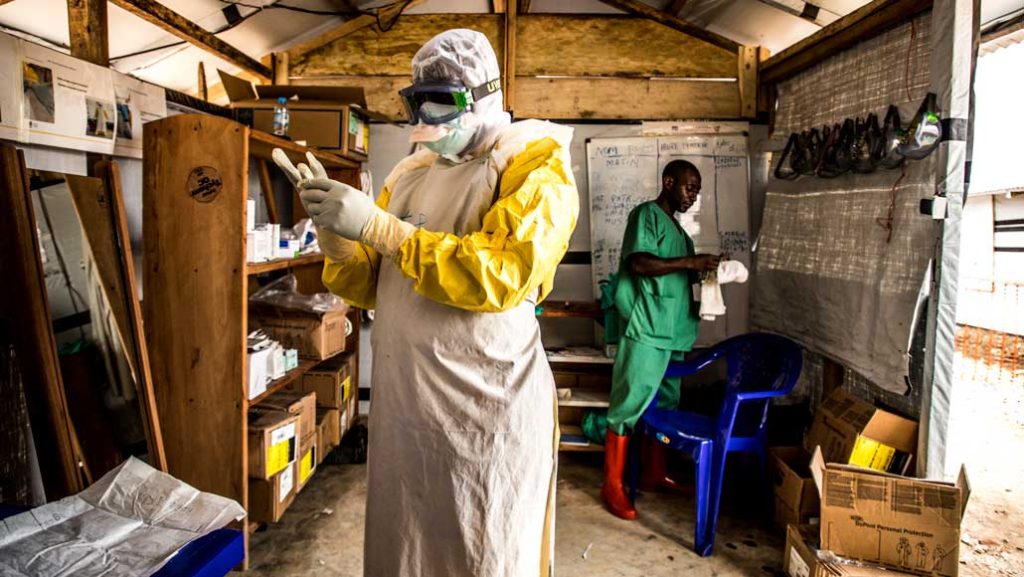The effectiveness of Ebola’s latest preferred drugs hinges on a number of factors that are beyond the control of the drugs’ manufacturers or clinical trial partners.
The National Institute of Allergy and Infectious Diseases’ (NIAID) announcement that two out of four candidate Ebola drugs proved effective was applauded globally. Preliminary results of the Pamoja Tulinde Maisha (PALM) study showed individuals receiving REGN-EB3 or mAb114 had a greater chance of survival compared to those that received ZMapp or remdesivir. The favorable results led to the early termination of the trial.
PALM is a randomized, controlled trial of four investigational agents (ZMapp, remdesivir, mAb114 and REGN-EB3) for the treatment of patients with Ebola virus disease. It commenced in November 2018 in the Democratic Republic of Congo (DRC) as part of the emergency response to the ongoing Ebola outbreak in DRC’s North Kivu and Ituri Provinces. Patients were enrolled at four Ebola Treatment Centers for the study in Beni, Katwa, Butembo and Mangina.
Mortality rate was lowest among individuals that received Regeneron’s REGN-EB3 (29%) followed by Ridgeback’s mAb114 (34%), Mapp’s ZMapp (49%) and Gilead Sciences’ remdesivir (53%).
Improved survival rates were also recorded among individuals that commenced treatment early in the course of the disease. 94% of patients with low viral load for Ebola survived following treatment with REGN-EB3.
An extension phase of the study is already underway and policymakers’ further decision on the drug candidates will be guided by the results of the final analysis of data expected late September or early October 2019.
Produced by Ridgeback Biotherapeutics, mAb114 is a monoclonal antibody that binds to a single target on the Ebola virus. The protein was isolated from a human survivor of the 1995 Ebola outbreak in Kikwit, DRC. Regeneron’s REGN-EB3 on the other hand, is a three-antibody cocktail that was designed to enhance efficacy, reduce the development of viral sequences that lead to resistance.
“The treatment dose is a single infusion of 150mg/kg, it’s a single dose treatment. Once a patient gets diagnosed with Ebola, they get a single infusion of REGEN-EB3 and they don’t need another dose”, Sumathi Sivapalasingam, Senior Director, Early Clinical Development and Experimental Sciences at Regeneron Pharmaceuticals tells healthnews.ng.
While its webpage on Ebola treatment and prevention still says “there is no proven treatment for Ebola”, the WHO concludes mAb114 and REGN-EB3 “are the only drugs that future patients will be treated with”.
Since Zmapp was dropped, its manufacturer, Mapp Biopharmaceuticals, has not said anything about the future of the drug which contains three monoclonal antibodies and was grown in plants.

Excitement and caution
Chikwe Ihekweazu, director general of Nigeria Centre for Disease Control (NCDC) tells healthnews.ng that he received the news on new treatment options with excitement and caution.
“It brings two forms of impact: direct clinical impact on improving the health of patients, and the effect that having treatment option has on the enthusiasm of healthcare workers delivering care”, Ihekweazu tells healthnews.ng. “These two drugs are by no means magic bullets, and we all await the detailed publication, but the announcement has lifted the spirits of thousands of colleagues involved in the response”, he said.
Oyewale Tomori, professor of virology and former Regional Virologist for the WHO Africa Region, noted that achieving early detection of Ebola across the country is not feasible in many African countries.
“Before many patients come for treatment, it is already too late. Poor diagnosis and late commencement of treatment are among the reasons why the new Ebola drugs may not be as effective as they can be in better settings during rollout”, Tomori tells healthnews.ng.
In regions affected by violence, Tomori added that individuals exposed to Ebola often have to take their chances with Ebola over bullets.
“When someone is sick in an area under insurgency and he has to flee that area, he goes to an area where nobody knows what is going on. There is no access to hospitals, he infects more people there. And by the time that occurrence gets to the attention of the WHO and other groups, many more people would have died”, Tomori says.
While admitting there were challenges initially with getting the drugs to the various units, Sivapalasingam tells healthnews.ng this has been surmounted.
“The people on the ground have been able to overcome those barriers”, Sivapalasingam tells healthnews.ng. She added that efforts are being made to ensure that sufficient dose is available.
Nigerian public health expert Lawal Bakare tells healthnews.ng conversation on pricing should be happening in addition to ensure easy access to the drugs but Sivapalasingam says it is “too early to discuss price” adding the drug is being made available for free in DRC through a partnership with the U.S. Department of Health and Human Services’ Biomedical Advanced Research and Development Authority (BARDA).
“It is through that partnership that the drug has been made available for this current outbreak as well as studies. It is too early to discuss price…What we and BARDA are dedicated to, is to continue to work hard to ensure sufficient doses are available for the current outbreak”, Sivapalasingam says.